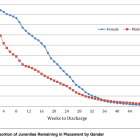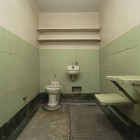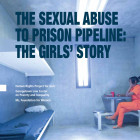
Girls in Justice System Often Traumatized Victims of Abuse
|
Girls are more likely to be arrested for less serious offenses but are more likely to have serious problems, including a history of physical and sexual abuse.
Juvenile Justice Information Exchange (https://jjie.org/tag/girls/page/2/)

Girls are more likely to be arrested for less serious offenses but are more likely to have serious problems, including a history of physical and sexual abuse.

Girls serve longer sentences than boys in the Texas juvenile justice system, and for less serious offenses, according to a new study from the University of Texas at Austin.

In video footage released today from inside Connecticut’s juvenile correctional facilities, a distressed girl screams as she is restrained on the ground in a corridor.
Through times of trauma and distress, often all a child needs is to be showered with love. It may sound corny, but for the estimated 100,000 children who are sexually exploited per year around the country, it can be transformative.

In the past two decades, the proportion of detained girls has increased at a rate four times as fast as the number of detained boys. And racial and ethnic disparities among justice-involved girls remain stark: Girls of color are detained, committed and sent to residential placements at rates significantly higher than their Caucasian counterparts.

The numbers are huge: An Oregon study found that 93 percent of girls in the state’s juvenile justice system had been sexually or physically abused at some time. South Carolina research found that 81 percent of girls in its system had experienced sexual abuse.
“I just figured since I was under 18 and I could do whatever and just end up in juvenile hall, I didn’t care,” Danielle Robinson said. “There were times I felt like I was going to change but that’s only because I was locked up. Once I got back on the street, I acted the same.”
But when she turned 18, things changed for Robinson — she served her last sentence in juvenile hall and had a daughter one year later.

By the time I was 12, I had been kicked out of two schools because of my violent outbursts. No one ever tried to find out why I was violent.

In our society, there is a deep underlying presence of age-old social gender role expectations. Girls should be “sugar and spice and everything nice.” The consequence for not meeting those gender role expectations is to be labeled for life “a bad girl” and have your trauma criminalized.

This problem is about much more than gender exclusivity in juvenile justice diversion programs. It is about the overall societal devaluation of the lives of girls, which is reflected in this country’s juvenile justice policies. And frankly, this is an act of violence.